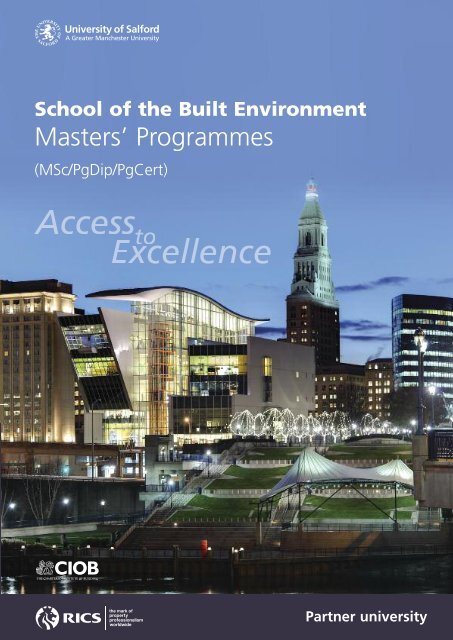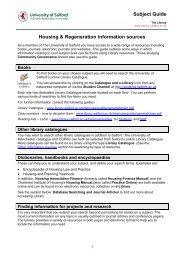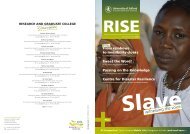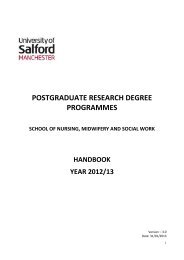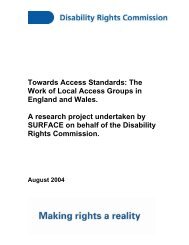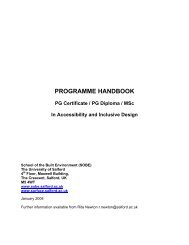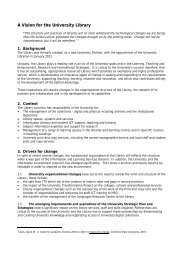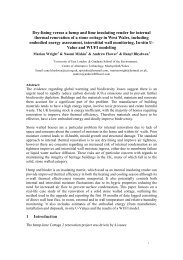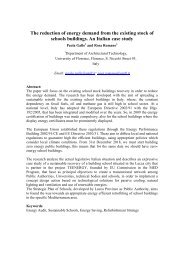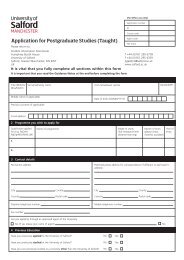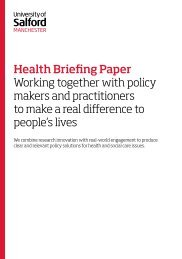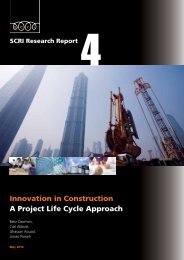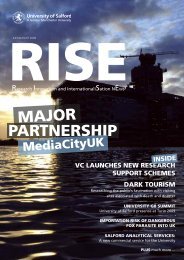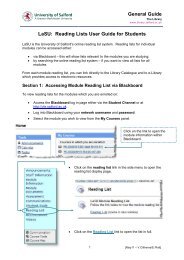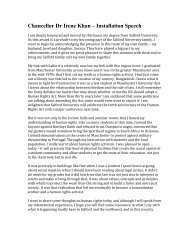Masters' Programmes - University of Salford
Masters' Programmes - University of Salford
Masters' Programmes - University of Salford
You also want an ePaper? Increase the reach of your titles
YUMPU automatically turns print PDFs into web optimized ePapers that Google loves.
School <strong>of</strong> the Built Environment<br />
Masters’ <strong>Programmes</strong><br />
(MSc/PgDip/PgCert)<br />
Partner university
Masters <strong>Programmes</strong><br />
Digital Architectural Design<br />
3 3 3 3<br />
The Built Environment for Healthcare programme is aimed at built<br />
BIM and Integrated Design<br />
3 3 3 3 3 3<br />
environment and healthcare pr<strong>of</strong>essionals involved with planning,<br />
Urban Design<br />
3 3 3 3 3<br />
procurement, design, construction and operation/facilities management <strong>of</strong><br />
Accessibility & Inclusive Design*<br />
3 3 3 3 x3<br />
healthcare environments. The programme covers the range <strong>of</strong> approaches<br />
Project Management in Construction 3 3 3 3<br />
3<br />
used in the healthcare sector to procure and manage projects including PFI,<br />
Construction Management*<br />
3<br />
3 3<br />
LIFT and Procure 21.<br />
Quantity Surveying<br />
3 3 3 3<br />
Our Quantity school Surveying is (Mechanical involved & Electrical) in a national 3 multi-million 3 pound 3 healthcare research3<br />
programme,<br />
Real Estate & Property<br />
aimed<br />
Management<br />
at delivering improved<br />
3 3<br />
healthcare infrastructure, which will<br />
3<br />
3<br />
continuously<br />
Real Estate Development<br />
inform the programme 3 content.<br />
3 3 The programme<br />
3<br />
may be<br />
3<br />
completed<br />
Corporate Real Estate<br />
from<br />
& Facilities<br />
anywhere<br />
Management<br />
in the<br />
3<br />
world<br />
3<br />
without<br />
3<br />
any<br />
3<br />
UK attendance.<br />
3<br />
Construction Law & Practice*<br />
3 3 3 3<br />
The Pr<strong>of</strong>essional Doctorate<br />
MSc<br />
3<br />
PgDip<br />
PgCert<br />
Full-time<br />
(on campus)<br />
refer to page 25 & 26 for details<br />
Accelerated<br />
distance<br />
learning<br />
Part-time<br />
(on campus)<br />
Part-time<br />
distance<br />
learning<br />
Minimum programme study duration by months<br />
SEPTEMBER INTAKE<br />
FULL-TIME CAMPUS-TAUGHT OR<br />
ACCELERATED DISTANCE LEARNING<br />
PART-TIME CAMPUS TAUGHT OR<br />
ONLINE DISTANCE LEARNING<br />
MSc<br />
PgDip<br />
PgCert<br />
MSc<br />
PgDip<br />
PgCert<br />
12 8<br />
4<br />
28<br />
20<br />
8<br />
*Construction Law & Practice/Construction Management<br />
MSc: 24 months PgDip: 16 Months PgCert: 8 months<br />
*Accessibility and Inclusive Design MSc: 32 months<br />
JANUARY INTAKE<br />
FULL-TIME CAMPUS-TAUGHT OR<br />
ACCELERATED DISTANCE LEARNING<br />
PART-TIME CAMPUS TAUGHT OR<br />
ONLINE DISTANCE LEARNING<br />
MSc<br />
PgDip<br />
PgCert<br />
MSc<br />
PgDip<br />
PgCert<br />
16<br />
12<br />
4<br />
32<br />
24<br />
12<br />
1
Access excellence with the UK’s premier<br />
School <strong>of</strong> the Built Environment<br />
The School <strong>of</strong> the Built Environment (SOBE) is a nationally and internationally recognised centre <strong>of</strong> excellence for Built Environment<br />
study and research. We <strong>of</strong>fer a comprehensive range <strong>of</strong> world class, management focused and, pr<strong>of</strong>essionally accredited postgraduate<br />
programmes, developed in partnership with the Built Environment industries and the Pr<strong>of</strong>essional Bodies. Our aim is to develop ever<br />
more highly skilled and innovative managers, able to take on the challenges <strong>of</strong> the future. Most programmes have intakes twice a year<br />
in January and September.<br />
Some <strong>of</strong> our programmes are designed to equip recent or aspiring entrants to the Built Environment sector with key skills. Other<br />
programmes <strong>of</strong>fer existing practitioners the opportunity <strong>of</strong> further highly advanced pr<strong>of</strong>essional development. All reflect the very latest<br />
thinking and practice in their sectors and benefit from our widely acclaimed research work. Where eligible our full MSc programmes<br />
are accredited by the relevant pr<strong>of</strong>essional bodies - students successfully completing the full masters programme are<br />
granted exemption from academic examination requirements for entry to the pr<strong>of</strong>ession.<br />
We <strong>of</strong>fer a variety <strong>of</strong> study modes to suit individual circumstances including the opportunity to combine study, with your career, by<br />
studying part-time on campus or via online distance learning. In our well established internet enabled interactive learning environment<br />
students work through downloaded programme material at their own pace, access the <strong>University</strong>’s library resources, interact with tutors<br />
and fellow students, submit coursework, and check assessment results. A demonstration video <strong>of</strong> this system can be viewed on<br />
our website www.sobe.salford.ac.uk<br />
<strong>Programmes</strong> Entry Requirements<br />
Applications for most programmes will normally be accepted from<br />
candidates who have:<br />
n A minimum <strong>of</strong> a second class undergraduate honours degree in a<br />
relevant discipline; Or<br />
n A minimum <strong>of</strong> a second class undergraduate honours degree in a non<br />
cognate discipline and significant relevant work experience; Or<br />
n A recognised appropriate pr<strong>of</strong>essional qualification; Or<br />
n Alternative significant and relevant experience, and/or qualifications.<br />
(Such candidates will be individually assessed for entry).<br />
Additional specific programme entry requirements<br />
Digital Architectural Design Programme<br />
n<br />
Quantity Surveying (M&E) Programme<br />
n Applicants should normally posess a cognate degree and M&E QS<br />
experience; Or<br />
n A non cognate degree and significant M&E QS experience<br />
Construction Law and Practice Programme<br />
n LLM award only: Applicants must possess a minimum <strong>of</strong> a second class<br />
undergraduate qualifying law degree; Or<br />
n<br />
Applicants should additionally possess basic CAD skills and are<br />
required to submit a portfolio <strong>of</strong> design work. (see page 3).<br />
A recognised appropriate pr<strong>of</strong>essional legal qualification.<br />
Important Information<br />
Application<br />
Application may be made online from our web site. You may apply at any<br />
time, however, we strongly encourage you to apply not less than 2<br />
months prior to your intended start date. If you will complete your<br />
bachelor’s degree in the next 12 months, you can reserve your place. We<br />
will confirm your place when you send us your final degree results.<br />
English Language Requirements<br />
If your undergraduate degree was not taught in English, you must<br />
provide evidence <strong>of</strong> your English language ability. You will need a<br />
minimum <strong>of</strong> IELTS 6, or an equivalent qualification, such as TOEFL. If your<br />
current English language qualification is below this level, you may be able<br />
to take one <strong>of</strong> the many pre-sessional English programmes in our School<br />
<strong>of</strong> Languages. (Visit www.languages.salford.ac.uk/efl)<br />
Fees, bursaries, scholarships and accommodation<br />
Fees<br />
Visit http://www.sobe.salford.ac.uk<br />
International Bursaries and Scholarships<br />
Visit www.salford.ac.uk/international/scholarships for details<br />
Accommodation<br />
Visit www.accommodation.salford.ac.uk<br />
Accessibility & Inclusive Design<br />
n An honours undergraduate degree third class and above; Or<br />
n A recognized appropriate pr<strong>of</strong>essional qualification, such as full<br />
membership <strong>of</strong> an appropriate pr<strong>of</strong>essional institution eg RICS, CIOB,<br />
RIBA or COT<br />
2
Digital Architectural Design<br />
(MSc/PgDip)<br />
This programme is intended primarily for graduate students and practitioners<br />
in the field <strong>of</strong> architecture, engineering and construction who wish to broaden<br />
their knowledge about state-<strong>of</strong>-the-art digital and media technologies and<br />
their application to architectural design. Students explore complex design<br />
phenomena, geometrical and generative digital design concepts, digital<br />
collaboration and also experiment with new digital fabrication technologies.<br />
Programme modes<br />
Full-time on campus<br />
Part-time on campus<br />
*subject to viable student numbers<br />
Programme start dates*<br />
January and September<br />
January and September<br />
Awards:<br />
Master <strong>of</strong> Science (180 credits)<br />
Or Postgraduate Diploma (120 credits)<br />
The final award certificate does not<br />
state the mode <strong>of</strong> delivery<br />
Portfolio - applicants are required to submit a portfolio <strong>of</strong> design work<br />
Your portfolio allows us to assess your potential to benefit from the programme by giving us an idea <strong>of</strong> your capacity to draw, model, make things,<br />
think creatively, manipulate form and organise information and ideas. It should include your best and most recent representative work whether from<br />
study, pr<strong>of</strong>essional work and/or self-initiated projects. If you participated as a team member in a project which you want to include in your portfolio,<br />
you should clarify your role in producing the included material.<br />
Your portfolio can include any combination <strong>of</strong> architectural design, speculative projects, art, buildings, research, freehand drawings, technical drawings,<br />
computer drawings, photographs, etc. If you have had a diverse educational or pr<strong>of</strong>essional background, you should include work that would best<br />
show the wider scope and development <strong>of</strong> your career.<br />
Your portfolio should be named, dated and presented thematically in a single easily accessible form indicating any s<strong>of</strong>tware you have used. Bound or<br />
loose-leaf sheets are acceptable, as well as digital portfolios formatted as a single PowerPoint or PDF. Physical models or installation work should be<br />
submitted as good quality photographs.<br />
3<br />
Access excellence with the UK’s premier School <strong>of</strong> the Built Environment<br />
Image source: GT Asia
Programme Structure and<br />
Assessment<br />
The Master’s programme consists <strong>of</strong> 3 taught<br />
and 2 studio modules then either a Research<br />
Methods module and Dissertation or a Design<br />
Briefing and Research by Design project. The<br />
studio-based modules challenge creativity and<br />
imagination through a design project and are<br />
studied in conjunction with the taught modules<br />
which provide the underpinning knowledge.<br />
The modules are delivered over a 15-week<br />
period. All modules are assessed through<br />
written coursework.<br />
Available Modules<br />
Theory <strong>of</strong> Digital Design<br />
(15 Credits – taught module):<br />
You investigate advanced digital design models,<br />
generative design, performance-based design,<br />
simulation, parametric design and fabrication<br />
processes and their impact on architectural<br />
design.<br />
n<br />
n<br />
n<br />
n<br />
Theoretical, technological and cultural<br />
foundations <strong>of</strong> design thinking<br />
Architectural form/tectonics and<br />
representational media<br />
The evolution <strong>of</strong> design methods and<br />
emerging practices<br />
Evolution <strong>of</strong> digital discourse in Architecture<br />
Digital Design Strategies<br />
and Techniques<br />
(15 Credits – taught module):<br />
Offers the opportunity to understand various<br />
digital technologies and the principles <strong>of</strong><br />
current systems including generative<br />
techniques, parametric technology, 3D printing,<br />
fabrication and information models. (S<strong>of</strong>tware<br />
used includes Generative Components,<br />
Rhinoceros, Grasshopper, Microstation,<br />
3D Max, etc.)<br />
n<br />
n<br />
n<br />
n<br />
n<br />
n<br />
Fundamentals <strong>of</strong> design, visualisation and<br />
representation<br />
Contemporary techniques in Digital<br />
Architectural Design<br />
Digital design processes and emerging<br />
methodologies<br />
Case studies <strong>of</strong> creative applications in<br />
architectural and urban contexts<br />
Generative, parametric and algorithmic<br />
design strategies<br />
Virtual and physical prototyping<br />
Advanced Technologies for<br />
Collaborative Design<br />
(30 Credits – taught module)<br />
Explores the impact <strong>of</strong> synchronous and<br />
asynchronous design communication and<br />
collaboration technologies and investigates the<br />
extent to which various technological tools<br />
facilitate generation, representation,<br />
rationalization, materialization and fabrication<br />
<strong>of</strong> design artefacts in collaborative and<br />
multidisciplinary settings.<br />
n<br />
n<br />
n<br />
n<br />
n<br />
n<br />
Contemporary techniques in Collaborative<br />
Design<br />
CAD/CAM paradigm and mass<br />
customization in architectural production<br />
File-to-Factory Processes (e.g.3D printer and<br />
Laser-Cutting technologies)<br />
Fundamentals <strong>of</strong> BIM and GIS in architectural<br />
design<br />
Collaborative knowledge modelling in<br />
design<br />
Mixed, augmented and virtual reality<br />
applications in design<br />
Hybrid Architecture<br />
(30 credits – studio module):<br />
We explore new hybrid forms and spaces,<br />
including interactive and responsive designs and<br />
their associated techniques and design issues<br />
such as social, cultural and environmental<br />
impact.<br />
n<br />
n<br />
n<br />
n<br />
n<br />
Analytical study <strong>of</strong> contemporary design<br />
cases<br />
Formulation <strong>of</strong> design problems<br />
Schematic design<br />
Design development<br />
Design presentation<br />
Virtual City<br />
(30 credits – studio module):<br />
We examine using emerging digital media and<br />
digital technologies to generate and<br />
communicate new design ideas.<br />
n<br />
n<br />
n<br />
n<br />
n<br />
Urban design in the digital age<br />
Objective and subjective readings<br />
Modeling paradigms in urban design<br />
Critical analysis <strong>of</strong> projects (Application <strong>of</strong><br />
VR, CAAD and GIS in urban design)<br />
Design presentation<br />
Then - either<br />
Research Methods (15 credits)<br />
Prepares students to undertake research at<br />
postgraduate level by engaging in good<br />
research planning, appraisal <strong>of</strong> a range <strong>of</strong><br />
research methods and understanding the<br />
importance <strong>of</strong> ethics and the relevance <strong>of</strong> this<br />
to the research process.<br />
And<br />
Dissertation (45 credits)<br />
This module allows learners to undertake a<br />
dissertation on a specific research topic related<br />
to the programme <strong>of</strong> study. You will engage in<br />
constructive research; empirical, theoretical or<br />
doctrinal research; or other types <strong>of</strong> recognised<br />
research whilst applying an ethical approach.<br />
Or<br />
Design Briefing (15 credits)<br />
Provides the opportunity for students to<br />
demonstrate good “design research” planning<br />
at postgraduate level through the application <strong>of</strong><br />
recognised design research strategies,<br />
techniques, and methodologies as well as how<br />
to produce a “design proposal” for research on<br />
a specific topic.<br />
And<br />
Research by Design (45 credits)<br />
This module allows students to undertake<br />
descriptive and exploratory research in a<br />
particular design context by applying recognised<br />
“research by design” methodologies and<br />
techniques to produce a sustained and logical<br />
argument. You will conduct research through<br />
design in a particular architectural and/or urban<br />
context; plan and propose new design<br />
variations and critically evaluate their impact.<br />
Please Advanced also Technologies refer to pages for 1 and 2 for important information.<br />
Visit: www.sobe.salford.ac.uk/sobe/programmes/postgraduate-programmes/<br />
4
BIM and Integrated Design<br />
(MSc/PgDip/PgCert)<br />
The programme addresses currently emerging needs <strong>of</strong> new skills for<br />
architects, designers and project managers: efficient multidisciplinary<br />
collaboration through the design and construction processes enabling the<br />
delivery <strong>of</strong> integrated design and delivery solutions with the support <strong>of</strong><br />
advanced technologies, such as Building Information Modelling (BIM).<br />
The programme will support pr<strong>of</strong>essionals in responding to current and future<br />
challenges in client expectations and societal needs, which are pushing<br />
pr<strong>of</strong>essionals to improved integration and coordination <strong>of</strong> formerly separate<br />
roles and responsibilities for the financial, environmental and social<br />
performance <strong>of</strong> the buildings throughout their whole lifecycle.<br />
Programme modes<br />
Full-time on campus<br />
part time on campus<br />
Part-time via online<br />
learning<br />
*subject to viable student numbers<br />
Programme start dates*<br />
January and September<br />
January and September<br />
January and September<br />
Awards:<br />
Master <strong>of</strong> Science (180 credits)<br />
Or Postgraduate Diploma (120 credits)<br />
Or Postgraduate Certificate (60 credits)<br />
The final award certificate does not<br />
state the mode <strong>of</strong> delivery<br />
5<br />
Access excellence with the UK’s premier School <strong>of</strong> the Built Environment<br />
Courtesy <strong>of</strong> Granlund Ltd
Courtesy <strong>of</strong> Tekla<br />
Programme Structure and<br />
Assessment<br />
The Masters’ programme consists <strong>of</strong> 4/5 taught<br />
modules followed by either a Research Methods<br />
module and Dissertation or a Design Briefing<br />
and Research by Design project. The modules<br />
are delivered over a 15 week period. Most<br />
modules are assessed through written<br />
coursework.<br />
Core Taught Modules<br />
Design Collaboration and<br />
Management <strong>of</strong> Integrated<br />
Projects (30 credits, Semester 1)<br />
n Building industry challenges and<br />
opportunities<br />
n The business value <strong>of</strong> BIM and integrated<br />
design<br />
n Design collaboration<br />
n Integrated project delivery<br />
n Lean design and construction<br />
n Lifecycle management and BIM<br />
Building Information Modelling<br />
Theory and Practice (30 credits,<br />
Semester 1)<br />
n The concept <strong>of</strong> BIM<br />
n BIM deployment strategies<br />
n Design and construction process for BIM<br />
n BIM tools in design<br />
n Interoperability, IFCs, parametric modelling<br />
and BIM<br />
n Building information exchange<br />
n Data sharing and design integration<br />
n BIM, energy efficiency and sustainability<br />
Lean Integrated Design and<br />
Production (30 credits, Semester 2)<br />
n Integrating people, process and technology<br />
n Lean construction/production<br />
n Continuous improvement<br />
n Process design and implementation<br />
n<br />
n<br />
Process mapping analysis<br />
Integrating project life cycles<br />
Optional Taught Modules<br />
Either<br />
Advanced Technologies for<br />
Collaborative Design (30 credits,<br />
Semester 2) (taught module)<br />
n Contemporary techniques in Collaborative<br />
Design<br />
n<br />
n<br />
n<br />
n<br />
n<br />
CAD/CAM paradigm and mass<br />
customization in architectural production<br />
File-to-Factory Processes (e.g.3D printer and<br />
Laser-Cutting technologies)<br />
Fundamentals <strong>of</strong> BIM and GIS in<br />
architectural design<br />
Collaborative knowledge modeling in<br />
design<br />
Mixed, augmented and virtual reality<br />
applications in design<br />
Or<br />
Building Performance Simulation &<br />
Analysis (15 credits, Semester 2)<br />
n Role <strong>of</strong> design modeling<br />
n Environmental and energy modeling<br />
s<strong>of</strong>tware<br />
n Simulating building performance<br />
n Communicating low carbon building Project<br />
And<br />
Sustainable Design Theory and<br />
Practice (15 credits, Semester 2)<br />
n Sustainable urban development theory<br />
n Sustainable building design<br />
n Visioning and sustainability assessment<br />
n Sustainable urban design community<br />
considerations<br />
n Sustainability appraisal<br />
n Good practice case studies and examples<br />
Then - either<br />
Research Methods (15 credits)<br />
Prepares students to undertake research at<br />
postgraduate level by engaging in good<br />
research planning, appraisal <strong>of</strong> a range <strong>of</strong><br />
research methods and understanding the<br />
importance <strong>of</strong> ethics and the relevance <strong>of</strong> this<br />
to the research process.<br />
And<br />
Dissertation (45 credits)<br />
This module allows learners to undertake a<br />
dissertation on a specific research topic related<br />
to the programme <strong>of</strong> study. You will engage in<br />
constructive research; empirical, theoretical or<br />
doctrinal research; or other types <strong>of</strong> recognised<br />
research whilst applying an ethical approach.<br />
Or<br />
Design Briefing (15 credits)<br />
Provides the opportunity for students to<br />
demonstrate good “design research” planning<br />
at postgraduate level through the application <strong>of</strong><br />
recognised design research strategies,<br />
techniques, and methodologies as well as how<br />
to produce a “design proposal” for research on<br />
a specific topic.<br />
And<br />
Research by Design (45 credits)<br />
This module allows students to undertake<br />
descriptive and exploratory research in a<br />
particular design context by applying recognised<br />
“research by design” methodologies and<br />
techniques to produce a sustained and logical<br />
argument. You will conduct research through<br />
design in a particular architectural and/or urban<br />
context; plan and propose new design<br />
variations and critically evaluate their impact.<br />
Please also refer to pages 1 and 2 for important information.<br />
Visit: www.sobe.salford.ac.uk/sobe/programmes/postgraduate-programmes/<br />
6
Urban Design<br />
(MSc/PgDip/PgCert)<br />
Ensuring sustainability and quality <strong>of</strong> life in urban and regional design<br />
involves both multi-disciplinary expertise and participatory processes. This<br />
programme, developed with the assistance <strong>of</strong> the UK Royal Town Planning<br />
Institute (RTPI), aims to develop physical digital design expertise in sustainable<br />
community design and policy, and will prepare students to collaborate<br />
effectively in multidisciplinary teams to address the challenges <strong>of</strong> revitalizing<br />
neighbourhoods, cities and regions. The programme explores issues around<br />
land-use, zoning, transportation and other infrastructure, mixed use<br />
development, neighbourhood design, urban geography, economics and policy<br />
and is intended for graduate Architecture and Urban Planning students as well<br />
as practitioners from these areas.<br />
Programme modes<br />
Full-time on campus<br />
Part-time on campus<br />
*subject to viable student numbers<br />
Programme start dates*<br />
January and September<br />
January and September<br />
Awards:<br />
Master <strong>of</strong> Science (180 credits)<br />
Or Postgraduate Diploma (120 credits)<br />
Or Postgraduate Certificate (60 credits)<br />
The final award certificate does not<br />
state the mode <strong>of</strong> delivery<br />
7<br />
Access excellence with the UK’s premier School <strong>of</strong> the Built Environment
Programme Structure and<br />
Assessment<br />
The Masters’ programme consists <strong>of</strong> 5 taught<br />
modules followed by either a Research Methods<br />
module and Dissertation or a Design Briefing<br />
and Research by Design project. The modules<br />
are delivered over a 15-week period. All<br />
modules are normally assessed through written<br />
coursework.<br />
Available Modules<br />
Place-making and Urban Design<br />
Practice (30 credits)<br />
The features <strong>of</strong> successful places and the role <strong>of</strong><br />
historical and cultural context<br />
n<br />
n<br />
n<br />
n<br />
n<br />
Typology and morphology in urban design<br />
Elements and features <strong>of</strong> dwelling and<br />
community, people’s needs, sensory<br />
experience, health safety and security<br />
Sustainable neighbourhood and community<br />
strategies<br />
Case studies analysis and critical appraisal<br />
Communication and representation in<br />
re/development projects<br />
Urban Design Theory and Methods<br />
(30 credits)<br />
The features <strong>of</strong> successful places and the role <strong>of</strong><br />
historical and cultural context<br />
Virtual City<br />
(30 credits – studio module)<br />
We examine using emerging digital media and<br />
digital technologies to generate and<br />
communicate new design ideas.<br />
n<br />
n<br />
n<br />
n<br />
n<br />
Urban design in the digital age<br />
Objective and subjective readings<br />
Modeling paradigms in urban design<br />
Critical analysis <strong>of</strong> projects (Application <strong>of</strong><br />
VR, CAAD and GIS in urban design)<br />
Design presentation<br />
Regeneration Project Planning and<br />
Management (15 credits)<br />
n Planning team formation and management<br />
n Master planning and design<br />
n Property valuation and use planning<br />
n Partnership and leadership<br />
n Stakeholder management<br />
n Managing organisational change<br />
Sustainable Design Theory and<br />
Practice (15 credits)<br />
n Sustainable urban development theory<br />
n Sustainable urban design<br />
n Community considerations<br />
n Sustainability appraisal<br />
n Case studies<br />
Then - either<br />
Research Methods (15 credits)<br />
Prepares students to undertake research at<br />
postgraduate level by engaging in good<br />
research planning, appraisal <strong>of</strong> a range <strong>of</strong><br />
research methods and understanding the<br />
importance <strong>of</strong> ethics and the relevance <strong>of</strong> this<br />
to the research process.<br />
And<br />
Dissertation (45 credits)<br />
This module allows learners to undertake a<br />
dissertation on a specific research topic related<br />
to the programme <strong>of</strong> study. You will engage in<br />
constructive research; empirical, theoretical or<br />
doctrinal research; or other types <strong>of</strong> recognised<br />
research whilst applying an ethical approach.<br />
Or<br />
Design Briefing (15 credits)<br />
Provides the opportunity for students to<br />
demonstrate good “design research” planning<br />
at postgraduate level through the application <strong>of</strong><br />
recognised design research strategies,<br />
techniques, and methodologies as well as how<br />
to produce a “design proposal” for research on<br />
a specific topic.<br />
And<br />
n<br />
n<br />
n<br />
n<br />
n<br />
n<br />
Urban Design Theories<br />
Diagnosis and contextual studies<br />
Urban design methods and techniques<br />
Current urban design practice<br />
Planning and the urban design process<br />
Case studies<br />
Research by Design (45 credits)<br />
This module allows students to undertake<br />
descriptive and exploratory research in a<br />
particular design context by applying recognised<br />
“research by design” methodologies and<br />
techniques to produce a sustained and logical<br />
argument. You will conduct research through<br />
design in a particular architectural and/or urban<br />
context; plan and propose new design<br />
variations and critically evaluate their impact.<br />
Please also refer to pages 1 and 2 for important information.<br />
Visit: www.sobe.salford.ac.uk/sobe/programmes/postgraduate-programmes/<br />
8
Accessibility & Inclusive Design<br />
(MSc/PgDip/PgCert)<br />
This programme is for students seeking to develop their knowledge <strong>of</strong> the<br />
barriers faced by people in accessing the environment and to learn how to<br />
make effective changes for improvement, including the contribution <strong>of</strong><br />
assistive technologies. The programme will appeal to a wide range <strong>of</strong> students<br />
from different backgrounds including, but not limited to built environment,<br />
social care and healthcare pr<strong>of</strong>essionals.<br />
Programme modes<br />
Part-time via online<br />
learning<br />
Accelerated online<br />
learning<br />
*subject to viable student numbers<br />
Programme start dates*<br />
January and September<br />
January and September<br />
Awards:<br />
Master <strong>of</strong> Science (180 credits)<br />
Or Postgraduate Diploma (120 credits)<br />
Or Postgraduate Certificate (60 credits)<br />
The final award certificate does not<br />
state the mode <strong>of</strong> delivery<br />
Pr<strong>of</strong>essional Recognition<br />
The National Register <strong>of</strong> Access Consultants<br />
(NRAC) do not validate programmes <strong>of</strong> study.<br />
However, for students wishing to apply<br />
to NRAC, the core competencies and<br />
experience objectives’ for an access consultant<br />
have been mapped to learning outcomes, such<br />
that the competencies required are covered in<br />
the programme.<br />
9<br />
Access excellence with the UK’s premier School <strong>of</strong> the Built Environment
Attendance<br />
The programme may be completed from<br />
anywhere in the world without any UK<br />
attendance. Whilst there is a minimal<br />
attendance requirement <strong>of</strong> a 4-day summer<br />
school to support Access Auditing and<br />
Consultancy, overseas based students may elect<br />
to take the Optional Independent Module, and<br />
would thereby avoid any compulsory<br />
attendance requirement. Other attendance<br />
requirements such as an introduction to the<br />
programme are optional.<br />
Programme Structure and<br />
Assessment<br />
The programme can be studied as part time<br />
distance learning or as accelerated distance<br />
learning. The accelerated mode is designed for<br />
students able to dedicate significant time to the<br />
programme, applications will be scrutinised to<br />
ensure the student is able to devote sufficient<br />
time for study in this manner. The Masters’ programme<br />
consists <strong>of</strong> 4 taught modules<br />
followed by either a Research Methods module<br />
and Dissertation or a Design Briefing and<br />
Research by Design project. The modules are<br />
delivered over a 15-week period. All modules<br />
are normally assessed through written<br />
coursework.<br />
Available Modules<br />
Design in the Built Environment<br />
(30 credits)<br />
n Design process overview<br />
n Analysing and responding to function<br />
n Technology and innovation<br />
n Aesthetics: visual quality and fashion<br />
n Sustainability issues<br />
n Economic and legal influences<br />
n Socio cultural and climatic factors<br />
n Appraisal techniques<br />
Designing for Accessibility and<br />
Inclusion (30 credits)<br />
n Models <strong>of</strong> disability and awareness training<br />
n Access to external and internal<br />
environments<br />
n Access to information<br />
n Emergency egress<br />
n Horizontal and vertical circulation<br />
n Cognition <strong>of</strong> the environment<br />
n Acoustics and audible cues<br />
n Visual cues, lighting & signage<br />
n Building management<br />
n User evaluation<br />
Rehabilitation and Assistive<br />
Technology in the Built<br />
Environment (30 credits)<br />
n Historical aspects AT application and<br />
rehabilitation<br />
n AT use versus social based models<br />
n Social economic and legal influences<br />
n Human factors<br />
n AT and rehabilitation applications and their<br />
selection<br />
n Implementation strategies<br />
n User trials and evaluation studies<br />
Access Auditing and Consultancy<br />
(30 credits)<br />
n Approaches to access auditing<br />
n Pricing & estimating for consultancy work<br />
n Designing a survey strategy<br />
n Interpreting architectural information<br />
n Construction technology<br />
n Problem-solving and lateral thinking<br />
n Surveying principles<br />
n Use <strong>of</strong> scientific instruments<br />
n Report writing & presentation skills<br />
Optional Independent Project<br />
(30 credits)<br />
n This module is designed to replace any <strong>of</strong><br />
the above modules. This module <strong>of</strong>fers<br />
students the chance to propose their own<br />
area <strong>of</strong> study topic, subject to tutor<br />
approval, in order to apply current<br />
knowledge and practice to an issue<br />
or problem.<br />
Then - either<br />
Research Methods (15 credits)<br />
Prepares students to undertake research at<br />
postgraduate level by engaging in good<br />
research planning, appraisal <strong>of</strong> a range <strong>of</strong><br />
research methods and understanding the<br />
importance <strong>of</strong> ethics and the relevance <strong>of</strong> this<br />
to the research process.<br />
And<br />
Dissertation (45 credits)<br />
This module allows learners to undertake a<br />
dissertation on a specific research topic related<br />
to the programme <strong>of</strong> study. You will engage in<br />
constructive research; empirical, theoretical or<br />
doctrinal research; or other types <strong>of</strong> recognised<br />
research whilst applying an ethical approach.<br />
Or<br />
Design Briefing (15 credits)<br />
Provides the opportunity for students to<br />
demonstrate good “design research” planning<br />
at postgraduate level through the application <strong>of</strong><br />
recognised design research strategies,<br />
techniques, and methodologies as well as how<br />
to produce a “design proposal” for research on<br />
a specific topic.<br />
And<br />
Research by Design (45 credits)<br />
This module allows students to undertake<br />
descriptive and exploratory research in a<br />
particular design context by applying recognised<br />
“research by design” methodologies and<br />
techniques to produce a sustained and logical<br />
argument. You will conduct research through<br />
design in a particular architectural and/or urban<br />
context; plan and propose new design<br />
variations and critically evaluate their impact.<br />
Please also refer to pages 1 and 2 for important information.<br />
Visit: www.sobe.salford.ac.uk/sobe/programmes/postgraduate-programmes/<br />
10
Project Management in Construction<br />
(MSc/PgDip/PgCert)<br />
This programme will transform an individual’s capability to make a significant<br />
input to business project management performance in any sector. It enables<br />
students to recognise the significance <strong>of</strong> process, technology and people to<br />
the success <strong>of</strong> projects; to more effectively lead, organise and plan projects; to<br />
analyse corporate practice and implement highly effective strategies for<br />
change.<br />
Programme modes<br />
Full-time on campus<br />
Part-time via online<br />
learning<br />
*subject to viable student numbers<br />
Programme start dates*<br />
January and September<br />
January and September<br />
Awards:<br />
Master <strong>of</strong> Science (180 credits)<br />
Or Postgraduate Diploma (120 credits)<br />
Or Postgraduate Certificate (60 credits)<br />
The final award certificate does not<br />
state the mode <strong>of</strong> delivery<br />
11
Attendance<br />
The part-time online distance learning<br />
programme may be completed from anywhere<br />
in the world without any UK attendance.<br />
Programme Structure and<br />
Assessment<br />
The Masters’ programme consists <strong>of</strong> 4 taught<br />
modules followed by a Research Methods<br />
module and Dissertation. The modules are<br />
delivered over a 15-week period. All modules<br />
are assessed through written coursework.<br />
Available Modules<br />
Culture and People (30 credits)<br />
n Cultural change<br />
n Group and teams<br />
n Organisational development<br />
n Effective team working<br />
n Change management<br />
Procurement in Construction and<br />
Property (30 credits)<br />
n Contractual frameworks<br />
n Procuring design and construction services<br />
n Partnering strategies<br />
n Supply chain management<br />
n Supplier appraisal<br />
n E procurement<br />
Process and Project Systems<br />
(30 credits)<br />
n Construction as a manufacturing process<br />
n Lean, agile and flexible production systems<br />
n Management <strong>of</strong> risk and value<br />
n Generic process models<br />
n Tools and techniques<br />
Lean Integrated Design and<br />
Construction (30 credits)<br />
n Integrating people, process and technology<br />
n Lean construction/production<br />
n Continuous improvement<br />
n Process design and implementation<br />
n Process mapping analysis<br />
n Integrating project life cycles<br />
Then<br />
Research Methods (15 credits)<br />
Prepares students to undertake research at<br />
postgraduate level by engaging in good<br />
research planning, appraisal <strong>of</strong> a range <strong>of</strong><br />
research methods and understanding the<br />
importance <strong>of</strong> ethics and the relevance <strong>of</strong> this<br />
to the research process.<br />
And<br />
Dissertation (45 credits)<br />
This module allows learners to undertake a<br />
dissertation on a specific research topic related<br />
to the programme <strong>of</strong> study. You will engage in<br />
constructive research; empirical, theoretical or<br />
doctrinal research; or other types <strong>of</strong> recognised<br />
research whilst applying an ethical approach.<br />
Pr<strong>of</strong>essional Accreditation<br />
The full Master award is accredited by the Royal<br />
Institution <strong>of</strong> Charted Surveyors (RICS) allowing<br />
exemption from RICS academic entry<br />
requirements. In addition the full Masters<br />
Programme is accredited by the Charted<br />
Institute <strong>of</strong> Building (CIOB).<br />
Please also refer to pages 1 and 2 for important information.<br />
Visit: www.sobe.salford.ac.uk/sobe/programmes/postgraduate-programmes/<br />
12
Construction Management<br />
(MSc/PgDip)<br />
This programme is intended primarily for students wishing to develop their<br />
careers in the United Kingdom. The programme is mapped to the underpinning<br />
knowledge <strong>of</strong> Construction Management NVQ level 5 and is designed to<br />
support the attainment <strong>of</strong> the black/pr<strong>of</strong>essional CSCS card in Construction<br />
Management. Students will learn to better organise and plan complex<br />
construction projects, to diagnose corporate problems and to effectively<br />
manage teams, procurement, finance and risk.<br />
Programme modes<br />
Full-time on campus<br />
Part-time via online<br />
learning<br />
*subject to viable student numbers<br />
Programme start dates*<br />
January and September<br />
September<br />
Awards:<br />
Master <strong>of</strong> Science (180 credits)<br />
Or Postgraduate Diploma (120 credits)<br />
The final award certificate does not<br />
state the mode <strong>of</strong> delivery<br />
Supported by<br />
13
Attendance<br />
The online distance learning programme may<br />
be completed from anywhere in the world<br />
without any UK attendance.<br />
This programme is primarily intended for UK<br />
students. International students interested in<br />
this programme should refer instead to the<br />
Project Management in Construction<br />
programme with similar content.<br />
Programme Structure and<br />
Assessment<br />
The Masters’ programme consists <strong>of</strong> 4 taught<br />
modules followed by a Research Methods<br />
module and Dissertation. All modules are<br />
assessed through coursework projects.<br />
Assessment is driven by 'real world' problems<br />
aligned to the students workplace and job role.<br />
The core modules are delivered over a 15 week<br />
period.<br />
Available Modules<br />
Project Management in the Built<br />
Environment (30 credits)<br />
n Managing health, safety, welfare and<br />
environmental factors<br />
n Controlling projects<br />
n Managing project design<br />
n Managing project feedback and evaluating<br />
feedback<br />
Procurement in the Built<br />
Environment (30 credits)<br />
n Project partnering<br />
n Managing invited tenders<br />
n Contracts and negotiation<br />
Finance & Risk Management in the<br />
Built Environment (30 Credits)<br />
n Managing project risks, opportunities,<br />
systems and teams<br />
n Managing factors affecting project<br />
feasibility<br />
n Managing bids and tenders<br />
n Managing financial expenditure and<br />
recovery<br />
People Management in the Built<br />
Environment (30 Credits)<br />
n Managing teams and individuals<br />
n Enhancing working relationships and<br />
developing staff<br />
n Managing disputes<br />
Then<br />
Research Methods (15 credits)<br />
Prepares students to undertake research at<br />
postgraduate level by engaging in good<br />
research planning, appraisal <strong>of</strong> a range <strong>of</strong><br />
research methods and understanding the<br />
importance <strong>of</strong> ethics and the relevance <strong>of</strong> this<br />
to the research process.<br />
And<br />
Dissertation (45 credits)<br />
This module allows learners to undertake a<br />
dissertation on a specific research topic related<br />
to the programme <strong>of</strong> study. You will engage in<br />
constructive research; empirical, theoretical or<br />
doctrinal research; or other types <strong>of</strong> recognised<br />
research whilst applying an ethical approach.<br />
Pr<strong>of</strong>essional Accreditation<br />
The full Master award is accredited by the Royal<br />
Institution <strong>of</strong> Charted Surveyors (RICS) allowing<br />
exemption from RICS academic entry<br />
requirements. In addition the full Masters<br />
Programme is accredited by the Charted<br />
Institute <strong>of</strong> Building (CIOB).<br />
Please also refer to pages 1 and 2 for important information.<br />
Visit: www.sobe.salford.ac.uk/sobe/programmes/postgraduate-programmes/<br />
14
Quantity Surveying<br />
(MSc/PgDip)<br />
The Quantity Surveying programme aims to create quantity surveyors capable<br />
<strong>of</strong> understanding, procurement, financial and risk management and life cycle<br />
cost management in the construction industry. Students also develop skills and<br />
capabilities to integrate and improve teamwork in construction operations.<br />
Quantity Surveying (Mechanical & Electrical)<br />
(MSc/PgDip)<br />
The Quantity Surveying (Mechanical & Electrical) programme is aimed both at<br />
practising QS pr<strong>of</strong>essionals and or senior construction pr<strong>of</strong>essionals seeking to<br />
improve their skills and capabilities in mechanical and electrical QS works.<br />
Programme modes<br />
Full-time on campus<br />
Part-time via online<br />
learning<br />
*subject to viable student numbers<br />
Programme start dates*<br />
January and September<br />
January and September<br />
Awards:<br />
Master <strong>of</strong> Science (180 credits)<br />
Or Postgraduate Diploma (120 credits)<br />
The final award certificate does not<br />
state the mode <strong>of</strong> delivery<br />
15
Attendance<br />
The part-time online learning programme may<br />
be completed from anywhere in the world<br />
without any UK attendance.<br />
Programme Structure and<br />
Assessment<br />
The Masters’ programme consists <strong>of</strong> 4 taught<br />
modules followed by a Research Methods<br />
module and Dissertation. The modules are<br />
delivered over a 15-week period. All modules<br />
are assessed through written coursework.<br />
Available Modules<br />
Financial and Risk Management<br />
(30 credits)<br />
n Decision theory and models<br />
n Risk and uncertainty value<br />
n Fuzzy, chaos and complexity theories<br />
n Risk appraisal techniques and risk transfer<br />
n Financial and value management<br />
techniques<br />
n Project evaluation & PFI / PPP effectiveness<br />
n Strategic choice in the context <strong>of</strong><br />
international projects<br />
Procurement in Construction and<br />
Property (30 credits)<br />
n Procurement frameworks<br />
n Procuring design and construction services<br />
n Partnering strategies<br />
n Supply chain management<br />
n Supplier appraisal<br />
n E procurement<br />
Process and Project Systems<br />
(30 credits)<br />
n Construction as a manufacturing process<br />
n Lean, agile and flexible production systems<br />
n Management <strong>of</strong> risk and value<br />
n Generic process models<br />
n Tools and techniques<br />
Then - either<br />
QS in Construction (30 credits)<br />
n General principles in domestic,<br />
non-domestic and refurbishment works<br />
n Design appreciation<br />
n Cost control and pricing<br />
n Measurement applications<br />
n Procurement and preparation <strong>of</strong> contracts<br />
n Claims and dispute resolution<br />
Or<br />
QS in M & E (30 credits)<br />
n General principles in mechanical<br />
(piped services, heating and ventilation),<br />
electrical (domestic, and industrial) and<br />
heavy construction (chemical and nuclear)<br />
n Design appreciation in M & E and heavy<br />
construction<br />
n Glossary <strong>of</strong> terms in M & E works<br />
n Cost control and pricing <strong>of</strong> M & E works<br />
n Measurement applications in M & E works<br />
n Procurement and preparation <strong>of</strong> contracts<br />
in M & E works<br />
n Claims and dispute resolution in M & E<br />
works<br />
Then<br />
Research Methods (15 credits)<br />
Prepares students to undertake research at<br />
postgraduate level by engaging in good<br />
research planning, appraisal <strong>of</strong> a range <strong>of</strong><br />
research methods and understanding the<br />
importance <strong>of</strong> ethics and the relevance <strong>of</strong> this<br />
to the research process.<br />
And<br />
Dissertation (45 credits)<br />
This module allows learners to undertake a<br />
dissertation on a specific research topic related<br />
to the programme <strong>of</strong> study. You will engage in<br />
constructive research; empirical, theoretical or<br />
doctrinal research; or other types <strong>of</strong> recognised<br />
research whilst applying an ethical approach.<br />
Pr<strong>of</strong>essional Accreditation<br />
The full Master award is accredited by the Royal<br />
Institution <strong>of</strong> Charted Surveyors (RICS) allowing<br />
exemption from RICS academic entry<br />
requirements.<br />
Please also refer to pages 1 and 2 for important information.<br />
Visit: www.sobe.salford.ac.uk/sobe/programmes/postgraduate-programmes/<br />
16
Real Estate & Property Management<br />
(MSc/PgDip)<br />
The programme has been developed to meet the needs <strong>of</strong> new entrants or<br />
aspiring pr<strong>of</strong>essionals seeking to work in the property pr<strong>of</strong>ession. It enables<br />
students to understand the workings <strong>of</strong> the commercial property market<br />
including its relevance to national/international financial and investment<br />
markets. Students will develop sound competence in current investment and<br />
appraisal techniques and appreciate legal, economic, planning, technical and<br />
facilities management factors in property management decision making.<br />
Programme modes<br />
Full-time on campus<br />
Part-time via online<br />
learning<br />
*subject to viable student numbers<br />
Programme start dates*<br />
January and September<br />
January and September<br />
Awards:<br />
Master <strong>of</strong> Science (180 credits)<br />
Or Postgraduate Diploma (120 credits)<br />
The final award certificate does not<br />
state the mode <strong>of</strong> delivery<br />
17
Attendance<br />
The part-time online programme may be<br />
completed from anywhere in the world without<br />
any UK attendance.<br />
Programme Structure and<br />
Assessment<br />
The Masters’ programme consists <strong>of</strong> 4 taught<br />
modules followed by a Research Methods<br />
module and Dissertation. The modules are<br />
delivered over a 15-week period. All modules<br />
are assessed through written coursework.<br />
Available Modules<br />
Valuation and Investment<br />
Appraisal (30 credits)<br />
n Characteristics and economics <strong>of</strong> the<br />
property market<br />
n Analysis <strong>of</strong> property market data and<br />
methods <strong>of</strong> valuation<br />
n Valuation <strong>of</strong> freehold and leasehold<br />
interests<br />
n RICS Valuation Standards<br />
n Investment in property and non-property<br />
assets<br />
n Portfolio principles and risk management<br />
n Appraisal and performance measurement<br />
Buildings in Use (30 credits)<br />
n The design & construction process<br />
n Appraising alternative solutions<br />
n Foundations, structures and enclosures<br />
n Strategic facilities management and<br />
measurement<br />
n Commercial procurement<br />
n Workplace design and organisational<br />
achievement<br />
n Environmental impact<br />
n Business continuity planning<br />
n Future trends<br />
Planning and Development<br />
(30 credits)<br />
n Land use planning<br />
n Planning law and regulation<br />
n Development plans and planning appeals<br />
n Sustainable development, urban<br />
renaissance and regeneration<br />
n Traditional development appraisal for land<br />
value and pr<strong>of</strong>it<br />
n Cash flow and advanced DCF appraisal<br />
techniques<br />
n Marketing <strong>of</strong> development schemes<br />
n Property development finance<br />
Then<br />
Research Methods (15 credits)<br />
Prepares students to undertake research at<br />
postgraduate level by engaging in good<br />
research planning, appraisal <strong>of</strong> a range <strong>of</strong><br />
research methods and understanding the<br />
importance <strong>of</strong> ethics and the relevance <strong>of</strong> this<br />
to the research process.<br />
And<br />
Dissertation (45 credits)<br />
This module allows learners to undertake a<br />
dissertation on a specific research topic related<br />
to the programme <strong>of</strong> study. You will engage in<br />
constructive research; empirical, theoretical or<br />
doctrinal research; or other types <strong>of</strong> recognised<br />
research whilst applying an ethical approach.<br />
Pr<strong>of</strong>essional Accreditation<br />
The full Master award is accredited by the Royal<br />
Institution <strong>of</strong> Charted Surveyors (RICS) allowing<br />
exemption from RICS academic entry<br />
requirements.<br />
Property Law and Practice<br />
(30 credits)<br />
n Legal principles underpinning property and<br />
investment<br />
n The nature <strong>of</strong> UK and international law<br />
n Contractual relationships<br />
n Pr<strong>of</strong>essional obligations and liabilities<br />
n Law <strong>of</strong> estate agency<br />
n Lease covenants and clauses<br />
Please also refer to pages 1 and 2 for important information.<br />
Visit: www.sobe.salford.ac.uk/sobe/programmes/postgraduate-programmes/<br />
18
Real Estate Development<br />
(MSc/PgDip)<br />
The Real Estate Development programme is aimed at experienced<br />
pr<strong>of</strong>essionals possessing good practical knowledge <strong>of</strong> property issues who are<br />
seeking to improve their capabilities to more advanced levels. Students will<br />
develop a critical awareness <strong>of</strong> the property development process, high level<br />
competence in appraisal techniques, greater environmental awareness and be<br />
able to undertake critical analysis <strong>of</strong> complex development practice.<br />
Programme modes<br />
Full-time on campus<br />
Part-time via online<br />
learning<br />
*subject to viable student numbers<br />
Programme start dates*<br />
January and September<br />
January and September<br />
Awards:<br />
Master <strong>of</strong> Science (180 credits)<br />
Or Postgraduate Diploma (120 credits)<br />
The final award certificate does not<br />
state the mode <strong>of</strong> delivery<br />
19
Attendance<br />
The part-time online programme may be<br />
completed from anywhere in the world without<br />
any UK attendance.<br />
Programme Structure and<br />
Assessment<br />
The Masters’ programme consists <strong>of</strong> 4 taught<br />
modules followed by a Research Methods<br />
module and Dissertation. The modules are<br />
delivered over a 15-week period. All modules<br />
are assessed through written coursework.<br />
Available Modules<br />
Planning and Development<br />
(30 credits)<br />
n Land use planning<br />
n Planning law and regulation<br />
n Development plans and planning appeals<br />
n Sustainable development, urban<br />
renaissance and regeneration<br />
n Traditional development appraisal for land<br />
value and pr<strong>of</strong>it<br />
n Cash flow and advanced DCF appraisal<br />
techniques<br />
n Marketing <strong>of</strong> development schemes<br />
n Property development finance<br />
Procurement in Construction and<br />
Property (30 credits)<br />
n Contractual frameworks<br />
n Procuring design and construction services<br />
n Partnering strategies<br />
n Supply chain management<br />
n Supplier appraisal<br />
n E procurement<br />
Process and Project Systems<br />
Management (30 credits)<br />
n Construction as a manufacturing process<br />
n Lean, agile flexible production systems<br />
n Management <strong>of</strong> risk and value<br />
n Generic process models<br />
n Project tools and techniques<br />
Valuation and Investment<br />
Appraisal (30 credits)<br />
n Characteristics and economics <strong>of</strong> the<br />
property market<br />
n Analysis <strong>of</strong> property market data and<br />
methods <strong>of</strong> valuation<br />
n Valuation <strong>of</strong> freehold and leasehold<br />
interests<br />
n RICS valuation standards<br />
Investment in property and non-property<br />
assets<br />
n Portfolio principles and risk management<br />
Appraisal and performance measurement<br />
Then<br />
Research Methods (15 credits)<br />
Prepares students to undertake research at<br />
postgraduate level by engaging in good<br />
research planning, appraisal <strong>of</strong> a range <strong>of</strong><br />
research methods and understanding the<br />
importance <strong>of</strong> ethics and the relevance <strong>of</strong> this<br />
to the research process.<br />
And<br />
Dissertation (45 credits)<br />
This module allows learners to undertake a<br />
dissertation on a specific research topic related<br />
to the programme <strong>of</strong> study. You will engage in<br />
constructive research; empirical, theoretical or<br />
doctrinal research; or other types <strong>of</strong> recognised<br />
research whilst applying an ethical approach.<br />
Pr<strong>of</strong>essional Accreditation<br />
The full Master award is accredited by the Royal<br />
Institution <strong>of</strong> Charted Surveyors (RICS) allowing<br />
exemption from RICS academic entry<br />
requirements.<br />
Please also refer to pages 1 and 2 for important information.<br />
Visit: www.sobe.salford.ac.uk/sobe/programmes/postgraduate-programmes/<br />
20
Corporate Real Estate & Facilities<br />
Management (MSc/PgDip/PgCert)<br />
This programme bridges the gap between the real estate and facilities<br />
management pr<strong>of</strong>essions. It aims to create high calibre graduates, who can<br />
think strategically with respect to property investment and also understand<br />
building performance issues at a technical level – attributes which are highly<br />
sought after in the developing pr<strong>of</strong>essional market worldwide.<br />
Programme modes<br />
Full-time on campus<br />
Part-time via online<br />
learning<br />
*subject to viable student numbers<br />
Programme start dates*<br />
January and September<br />
January and September<br />
Awards:<br />
Master <strong>of</strong> Science (180 credits)<br />
Or Postgraduate Diploma (120 credits)<br />
Or Postgraduate Certificate (60 credits)<br />
The final award certificate does not<br />
state the mode <strong>of</strong> delivery<br />
21
Attendance<br />
The part-time online distance learning<br />
programme may be completed from anywhere<br />
in the world without any UK attendance.<br />
Programme Structure and<br />
Assessment<br />
The Masters’ programme consists <strong>of</strong> 4 taught<br />
modules followed by a Research Methods<br />
module and Dissertation. The modules are<br />
delivered over a 15-week period. All modules<br />
are assessed through written coursework.<br />
Available Modules<br />
Strategic Facilities Management<br />
(30 credits)<br />
n Strategic FM and processes<br />
n Global business environments<br />
n Organisational culture and development<br />
n Knowledge management<br />
n World class performance<br />
n FM futures<br />
Facilities Management Excellence<br />
(30 credits)<br />
n Business & organisational excellence<br />
n Agile, learning organisations<br />
n People and service excellence<br />
n Empowerment<br />
n Relationship management<br />
Buildings in Use (30 Credits)<br />
n The design & construction process<br />
n Appraising alternative solutions<br />
n Foundation, structures and enclosures<br />
n Strategic facilities management and<br />
measurement<br />
n Commercial procurement<br />
n Workplace design and organisational<br />
achievement<br />
n Environmental impact<br />
n Business continuity planning<br />
n Future trends<br />
Procurement in Construction<br />
and Property (30 Credits)<br />
n Contractual frameworks<br />
n Procuring design and construction services<br />
n Partnering strategies<br />
n Supply chain management<br />
n Supplier appraisal<br />
n E-procurement<br />
Then<br />
Research Methods (15 credits)<br />
Prepares students to undertake research at<br />
postgraduate level by engaging in good<br />
research planning, appraisal <strong>of</strong> a range <strong>of</strong><br />
research methods and understanding the<br />
importance <strong>of</strong> ethics and the relevance <strong>of</strong> this<br />
to the research process.<br />
And<br />
Dissertation (45 credits)<br />
This module allows learners to undertake a<br />
dissertation on a specific research topic related<br />
to the programme <strong>of</strong> study. You will engage in<br />
constructive research; empirical, theoretical or<br />
doctrinal research; or other types <strong>of</strong> recognised<br />
research whilst applying an ethical approach.<br />
Pr<strong>of</strong>essional Accreditation<br />
The full Master award is accredited by the Royal<br />
Institution <strong>of</strong> Charted Surveyors (RICS) allowing<br />
exemption from RICS academic entry<br />
requirements.<br />
Please also refer to pages 1 and 2 for important information.<br />
Visit: www.sobe.salford.ac.uk/sobe/programmes/postgraduate-programmes/<br />
22
Construction Law and Practice<br />
(MSc/LLM/PgDip/PgCert)<br />
The programme will enable built environment pr<strong>of</strong>essionals including<br />
surveyors, lawyers, engineers and architects, to operate more effectively in<br />
areas <strong>of</strong> construction practice which involve construction law. Students will be<br />
able to conduct and communicate legal analysis in relation to any aspect <strong>of</strong><br />
mainstream pr<strong>of</strong>essional construction practice as well as to promote high<br />
quality research in areas <strong>of</strong> law relating to construction.<br />
Programme modes<br />
Part-time via online<br />
learning<br />
*subject to viable student numbers<br />
Programme start dates*<br />
September<br />
Awards:<br />
Master <strong>of</strong> Science (180 credits)<br />
LLM (180 Credits)<br />
Or Postgraduate Diploma (120 credits)<br />
Or Postgraduate Certificate (60 credits)<br />
The final award certificate does not<br />
state the mode <strong>of</strong> delivery<br />
23
Attendance<br />
The programme may be completed from<br />
anywhere in the world without any UK<br />
attendance. Overseas students should note that<br />
the course content is focussed upon the law <strong>of</strong><br />
England and Wales.<br />
Programme Structure, and<br />
Assessment<br />
The Masters’ programme is jointly delivered<br />
with the <strong>Salford</strong> Law School and consists <strong>of</strong> 4<br />
taught modules (3 core modules and 1 elective<br />
module) followed by a Research Methods module<br />
and Dissertation. The modules are delivered<br />
over a 15-week period. All modules are<br />
assessed through written coursework only.<br />
Core Modules<br />
Fundamentals <strong>of</strong> Construction Law<br />
(30 credits)<br />
n Common law underpinning construction<br />
contracts<br />
n Source, rationale and nature <strong>of</strong> key terms<br />
(scope, cost, quality, time, variation)<br />
n Contract formation<br />
n Implication <strong>of</strong> terms<br />
n Mistake, frustration, breach, causation and<br />
loss<br />
Construction Contracts - Operation<br />
and Administration (30 credits)<br />
n Operation and administration <strong>of</strong> Standard<br />
Form Contracts (SFCs)<br />
n Comparison between SFCs<br />
n Consideration <strong>of</strong> key terms in SFCs<br />
n Role <strong>of</strong> the Contract Administrator<br />
n Impact <strong>of</strong> industry specific legislation on<br />
construction contracts<br />
Liability and Complexity in<br />
Construction Law (30 credits)<br />
n Legal complexities and commercial risks<br />
n Design liability<br />
n Limitation<br />
n Sub-contracting<br />
n Contribution and contributory negligence<br />
n Insurance<br />
n Insolvency<br />
Elective Modules<br />
Dispute Resolution - Law and<br />
Practice (30 credits)<br />
n Dispute resolution methods, including<br />
litigation, arbitration and ADR (mediation,<br />
DRBs, early neutral evaluation, conciliation,<br />
and expert determination)<br />
n The Law and practice relating to statutory<br />
adjudication in the UK<br />
Contemporary Procurement in<br />
Construction (30 credits)<br />
n Alternative contractual frameworks<br />
including partnering strategies and<br />
e-procurement<br />
n Detailed consideration <strong>of</strong> Public/Private<br />
procurement strategies and procedures<br />
n EU procurement<br />
Construction Law and the<br />
Environment (30 credits)<br />
n UK and EU Law governing the protection<br />
and restoration <strong>of</strong> the environment<br />
n Planning law<br />
n Pollution (contaminated land, water<br />
pollution, integrated pollution<br />
prevention, nature conservation)<br />
n ‘Green buildings’, energy efficiency and<br />
environmental liability.<br />
Then<br />
MSc students<br />
Research Methods (15 credits)<br />
Prepares students to undertake research at<br />
postgraduate level by engaging in good<br />
research planning, appraisal <strong>of</strong> a range <strong>of</strong><br />
research methods and understanding the<br />
importance <strong>of</strong> ethics and the relevance <strong>of</strong> this<br />
to the research process.<br />
And<br />
Dissertation (45 credits)<br />
This module allows learners to undertake a<br />
dissertation on a specific research topic related<br />
to the programme <strong>of</strong> study. You will engage in<br />
constructive research; empirical, theoretical or<br />
doctrinal research; or other types <strong>of</strong> recognised<br />
research whilst applying an ethical approach.<br />
LLM students<br />
Dissertation (60 credits)<br />
Students propose a convincing research<br />
proposal in their chosen programme-related<br />
area and proceed to research their topic and<br />
submit a dissertation.<br />
Pr<strong>of</strong>essional Accreditation<br />
The full Master award is accredited by the Royal<br />
Institution <strong>of</strong> Charted Surveyors (RICS) allowing<br />
exemption from RICS academic entry<br />
requirements.<br />
Please also refer to pages 1 and 2 for important information.<br />
Visit: www.sobe.salford.ac.uk/sobe/programmes/postgraduate-programmes/<br />
24
The Pr<strong>of</strong>essional Doctorate programme<br />
A doctorate is the highest level academic qualification which a university can<br />
bestow. This pr<strong>of</strong>essional doctorate programme provides practising UK based<br />
pr<strong>of</strong>essionals with the opportunity to study part-time for a doctoral award<br />
which recognises their specialism in the built environment.<br />
Programme modes<br />
Part-time via online<br />
learning -<br />
supplemented by<br />
weekend workshops<br />
*subject to viable student numbers<br />
Programme start dates*<br />
September<br />
Awards:<br />
Doctor <strong>of</strong> the Built Environment (DBEnv)<br />
Doctor <strong>of</strong> Real Estate (DRealEst)<br />
Doctor <strong>of</strong> Construction Management (DConsMgt)<br />
The final award certificate does not<br />
state the mode <strong>of</strong> delivery<br />
25
Features <strong>of</strong> the Pr<strong>of</strong>essional<br />
Doctorate programme<br />
n<br />
n<br />
n<br />
The programme is tailored to the needs <strong>of</strong><br />
practitioners who wish to study for a<br />
doctorate on a part-time basis. It provides<br />
them with the academic support and<br />
guidance needed to produce a doctoral<br />
level piece <strong>of</strong> work based on their<br />
pr<strong>of</strong>essional expertise and workplace<br />
challenges.<br />
The programme, which can be completed<br />
in four years (by students holding an<br />
approved masters qualificaton), is<br />
structured on a modular basis and credits<br />
are awarded for modules during the early<br />
stages. This provides essential research skills<br />
tuition during the first phase <strong>of</strong> the<br />
programme and allows for the possibility <strong>of</strong><br />
students progressing at different rates,<br />
according to personal and pr<strong>of</strong>essional<br />
circumstances. Assessment is normally<br />
based on a combination <strong>of</strong> coursework,<br />
thesis and a final viva voce examination.<br />
Successful completion <strong>of</strong> the programme<br />
leads to the award <strong>of</strong> one <strong>of</strong> three named<br />
doctorates according to the student’s<br />
particular pr<strong>of</strong>essional specialism. Students<br />
study as part <strong>of</strong> a cohort with other built<br />
environment pr<strong>of</strong>essionals. They attend<br />
regular all-day workshops on Saturdays<br />
throughout their period <strong>of</strong> study.<br />
Further support is provided by their<br />
personal research supervisor and via the<br />
<strong>University</strong>’s online virtual learning<br />
environment (VLE). As their research<br />
develops students also have the<br />
opportunity <strong>of</strong> presenting their work at international<br />
research conferences as a recognised<br />
member <strong>of</strong> the <strong>University</strong>’s research community.<br />
Entry requirements<br />
n<br />
n<br />
n<br />
n<br />
A minimum <strong>of</strong> good Honours Degree (or<br />
equivalent) from a recognised <strong>University</strong><br />
or<br />
A Masters degree (or equivalent) from a<br />
recognised <strong>University</strong><br />
or<br />
A minimum <strong>of</strong> three years relevant<br />
post-qualification experience.<br />
and<br />
An appropriate pr<strong>of</strong>essional qualification<br />
English language requirements<br />
If your existing degree was not taught in<br />
English, you must provide evidence <strong>of</strong> your<br />
English language ability. You will need IELTS 6,<br />
or an equivalent qualification (see<br />
http://www.languages.salford.ac.uk/<br />
efl/admin/ug_reqphp.php for equivalencies). If<br />
your current English language qualification is<br />
below this level, you may be able to take one <strong>of</strong><br />
the many pre-sessional English courses in our<br />
School <strong>of</strong> Languages.<br />
For more information visit<br />
www.languages.salford.ac.uk/efl.<br />
Award<br />
Students who successfully complete the whole<br />
programme will normally receive the award <strong>of</strong>:<br />
Doctor <strong>of</strong> the Built Environment (DBEnv).<br />
Alternatively, students may elect to receive one<br />
<strong>of</strong> the following awards, according to the<br />
subject area <strong>of</strong> their thesis:<br />
Pr<strong>of</strong>essional “The Pr<strong>of</strong>essional Accreditation Doctorate<br />
gives me the opportunity<br />
The full Master award accredited by the Royal<br />
to gain expertise while<br />
Institution <strong>of</strong> Charted Surveyors (RICS) allowing<br />
facilitating knowledge<br />
exemption from RICS academic entry<br />
requirements. transfer between practice<br />
and academia. The<br />
programme makes me<br />
(and my employer) more<br />
attractive to clients. The<br />
programme workshops are<br />
on Saturdays which helps<br />
me balance study and<br />
pr<strong>of</strong>essional employment in<br />
a pr<strong>of</strong>essional practice.”<br />
Philip Antino: Pr<strong>of</strong>essional Doctorate<br />
Please also refer to pages 1 and 2 for important information.<br />
Visit: www.sobe.salford.ac.uk/sobe/programmes/research-degrees/<br />
26
School <strong>of</strong> the Built Environment<br />
<strong>University</strong> <strong>of</strong> <strong>Salford</strong><br />
<strong>Salford</strong><br />
Greater Manchester<br />
United Kingdom<br />
M5 4WT<br />
Enquiries:<br />
T: +44 (0) 161 295 4600<br />
F: +44 (0) 161 295 5011<br />
E: progs-sobe@salford.ac.uk<br />
www.sobe.salford.ac.uk<br />
This brochure is available in alternative formats<br />
upon request.<br />
GLASGOW<br />
EDINBURGH<br />
CARLISLE<br />
NEWCASTLE<br />
LEEDS<br />
MANCHESTER<br />
SALFORD<br />
BIRMINGHAM<br />
CARDIFF<br />
BRISTOL<br />
SOUTHAMPTON<br />
LONDON<br />
NORWICH<br />
the design team, university <strong>of</strong> salford T: 0161 295 2639 31408/11


